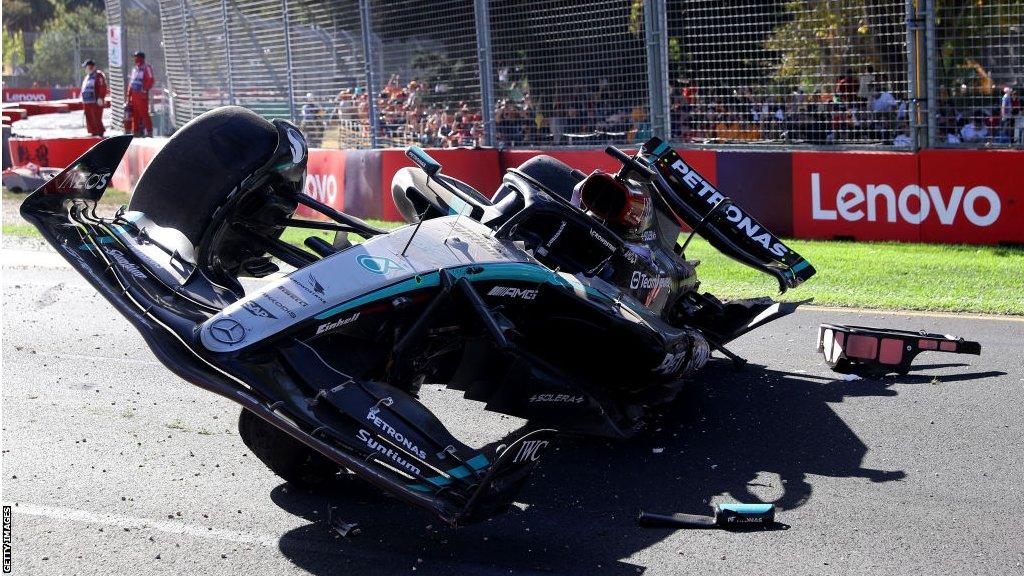Formula 1: Fernando Alonso given penalty for incident that led to Russell crash
- Published

George Russell's crash rounded off a poor weekend for Mercedes
Aston Martin driver Fernando Alonso was penalised 20 seconds for "potentially dangerous driving" at the Australian Grand Prix.
The two-time world champion told stewards he had "got it slightly wrong" in the incident that led to a heavy crash for Mercedes' George Russell.
Alonso admitted he had braked too early at Turn Six and then accelerated again.
Stewards said he had the right to change his approach but punished him for "doing something extraordinary".
The penalty dropped him from sixth place to eighth in the results. He was also given three penalty points on his licence.
But Alonso said he was "surprised" by the decision on social media afterwards: "A bit surprised by a penalty at the end of the race regarding how we should approach the corners or how we should drive the race cars. At no point do we want to do anything wrong at these speeds.
"I believe that without gravel on that corner, on any other corner in the world we will never be even investigated. In F1, with over 20 years of experience, with epic duels like Imola 2005/2006/Brazil 2023, changing racing lines, sacrificing entry speed to have good exits from corners is part of the art of motorsport.
"We never drive at 100% every race lap and every corner, we save fuel, tyres, brakes, so being responsible for not making every lap the same is a bit surprising."
Russell said that Alonso's driving on the final lap of the race had been a direct contributor to him losing control through the corner and crashing.
His car came to rest upside down in the middle of the track and led to the race finishing under a virtual safety car.
Russell said: "It caught me by surprise. I was half a second behind him and next thing he slams on the brakes, accelerates again and then slams on the brakes again.
"I was half a second behind and then next thing I am on his gearbox, lost the rear, caught it and then clipped the wall. It was a much more dramatic crash than it should have been.
"I'm OK. It was not a pleasant place to be in the middle of a high-speed corner on the racing line with the VSC [virtual safety car] taking 10-15 seconds to come out.
"It doesn't sound like a lot but you can have three cars coming around the corner in 10 seconds and when you're doing 250km/h and a car in the middle of the road, I was really quite worried."
Russell told stewards, whose report was not published until nearly three hours after the race, that Alonso's driving had been "erratic, took him by surprise and caused him to close distance unusually fast, and with the resulting lower downforce at the apex of the corner, he lost control and crashed at the exit of the corner".
The stewards' report said Alonso lifted off the accelerator just over 100m earlier than he ever had before into that corner during the race.
The stewards said: "He also braked very slightly at a point that he did not usually brake (although the amount of brake was so slight that it was not the main reason for his car slowing) and he downshifted at a point he never usually downshifted.
"He then upshifted again, and accelerated to the corner before lifting again to make the corner. Alonso explained that while his plan was to slow earlier, he got it slightly wrong and had to take extra steps to get back up to speed.
"Nonetheless, this manoeuvre created a considerable and unusual closing speed between the cars."
The move was effectively what is known in F1 as a "brake test" and is considered an unacceptable form of racing by most drivers.
The report into the incident added: "The stewards considered that they do not have sufficient information to determine whether Alonso's manoeuvre was intended to cause Russell problems, or whether as he stated to the stewards that he simply was trying to get a better exit.
"Should Alonso have the right to try a different approach to the corner? Yes. Should Alonso be responsible for dirty air, that ultimately caused the incident? No.
"However, did he choose to do something, with whatever intent, that was extraordinary, ie lifting, braking, downshifting and all the other elements of the manoeuvre over 100m earlier than previously, and much greater than was needed to simply slow earlier for the corner?
"Yes by his own account of the incident he did, and in the opinion of the stewards by doing these things, he drove in a manner that was at very least 'potentially dangerous' given the very high speed nature of that point of the track."